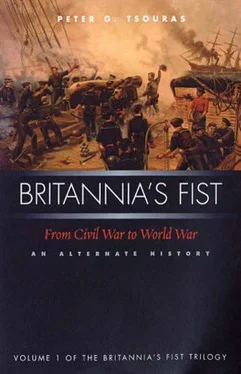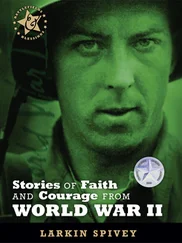Peter Tsouras - Britannia's Fist - From Civil War to World War
Здесь есть возможность читать онлайн «Peter Tsouras - Britannia's Fist - From Civil War to World War» весь текст электронной книги совершенно бесплатно (целиком полную версию без сокращений). В некоторых случаях можно слушать аудио, скачать через торрент в формате fb2 и присутствует краткое содержание. Год выпуска: 2008, ISBN: 2008, Издательство: Potomac Books Inc., Жанр: Альтернативная история, на английском языке. Описание произведения, (предисловие) а так же отзывы посетителей доступны на портале библиотеки ЛибКат.
- Название:Britannia's Fist: From Civil War to World War
- Автор:
- Издательство:Potomac Books Inc.
- Жанр:
- Год:2008
- ISBN:9781574888232
- Рейтинг книги:3 / 5. Голосов: 1
-
Избранное:Добавить в избранное
- Отзывы:
-
Ваша оценка:
- 60
- 1
- 2
- 3
- 4
- 5
Britannia's Fist: From Civil War to World War: краткое содержание, описание и аннотация
Предлагаем к чтению аннотацию, описание, краткое содержание или предисловие (зависит от того, что написал сам автор книги «Britannia's Fist: From Civil War to World War»). Если вы не нашли необходимую информацию о книге — напишите в комментариях, мы постараемся отыскать её.
Britannia's Fist: From Civil War to World War — читать онлайн бесплатно полную книгу (весь текст) целиком
Ниже представлен текст книги, разбитый по страницам. Система сохранения места последней прочитанной страницы, позволяет с удобством читать онлайн бесплатно книгу «Britannia's Fist: From Civil War to World War», без необходимости каждый раз заново искать на чём Вы остановились. Поставьте закладку, и сможете в любой момент перейти на страницу, на которой закончили чтение.
Интервал:
Закладка:
Still, Seward was an enormous presence in any room. A slight man, thin-faced with a mop of tousled hair that no comb dared approach, he was the master of his own domain of foreign policy, subject only to Lincoln’s broad policy guidance. William Russell, the famous British journalist, described him in 1861 as “a subtle, quick man, rejoicing in power, given to perorate and to oracular utterances, fond of badinage, bursting with the importance of state mysteries, and with the dignity of directing foreign policy of the greatest country-as all Americans think-in the world.” 3He had not hesitated to use that power in the dangerous first months of Lincoln’s presidency. He had recommended and executed the policy to suspend the writ of habeas corpus to arrest thousands of Southern sympathizers and collaborators. He had pressured the British diplomatically by putting on an aggressive, anti-British front to warn them off from supporting the South too much. That and every other measure to curb British support for the Confederacy had failed. That failure was the subject of today’s cabinet meeting and Seward’s briefing. It would be laced with the Secretary’s widely acknowledge gift for swearing, something Lincoln took enormous amusement in.
“We are approaching a damned crisis we do not seem able to control. Ambassador Adams reports that the work on the two infernal rams at the Laird Brothers’ shipbuilding works in Birkenhead near Liverpool continues at an accelerated pace. Adams writes as of the 11th of last month, ‘All the appliances of British skill to the arts of destruction appear to be resorted to for the purpose of doing injury to the people of the United States.… It is not unnatural that such proceedings should be regarded by the government and people of the United States with the greatest alarm, virtually as tantamount to a participation in the war by the government of Great Britain.’” 4
Seward continued, “I do not need to remind you that Laird built the infamous Alabama . Her construction number was 292; that of the rams, 294 and 295. Laird Brothers is so damned confident that they mock us with the very ship’s construction numbers. Our consul in Liverpool, Thomas Dudley, has reported in minute detail the progress of construction and proof that they are intended for delivery to Confederate agents.” He brought a letter out his portfolio. “This is from Dudley on the 21st of last month, describing the construction of even another ram up in Glasgow. ‘On Thursday of last week I went to Glasgow and took with me one of my men. I obtained a good view of the Ram building for the Confederates by George Thompson from the river, which is very narrow. She is up high and so much exposed that I could see her as if in the yard. Only a part of the armour plates are on as yet, and from appearances I should judge she could not be ready for launching for two months at least.’ He also writes they intend to name this ram the Virginia .”
Seward went on, the steam almost rising from his collar. “Adams presents these proofs to the British Foreign Minister, and Sir John Russell, in turn, replied with a straight face that they constitute no real proofs, that they are based on ‘hearsay rumor.’ I am convinced he is only following the direction of the Prime Minister. Lord Palmerston is no friend of the United States and sets the tone for the entire cabinet. He is set upon the success of the rebellion. I am convinced that otherwise the English Ministry are our friends with the exception of the chief. His course and conduct are execrable.” He handed the papers to Lincoln.
“Seward,” began Lincoln with such a hard edge that the Secretary of State straightened in his chair, “I would not so easily assume Russell’s good will. He has expressed the opinion that the South should be and will be independent. I still haven’t forgotten his comments on the Emancipation Proclamation.” His hand grasped the papers so tightly that they crumpled as his jaw set hard. “That man is no friend of the United States.” The cabinet was taken aback. None of them had ever heard him speak so harshly of anyone.
The President picked up another document from the table and went on, “Russell wrote, ‘There seems to be no declaration of a principle adverse to slavery in this proclamation. It is a measure of a very questionable kind.’A very questionable kind? How dare he affront this great thing we are about? I have to bring the people along on emancipation step by step. They will not be rushed, but are willing to learn. I cannot beat into them what only time and the evidence of their own common and moral senses tell them.” His fist with the crumpled papers pounded the arm of his chair.
“England will live to regret her inimical attitude towards us. After the collapse of the rebellion, John Bull will find that he has injured himself much more seriously than us.” 9
Seward tried to lighten the mood. “I have this description from a fellow countryman of Russell’s, Sidney Smith. He said of Russell, ‘He would have been willing to have built St. Peter’s, commanded the Channel Squadron, or to have operated on a patient for the stone and would not have been deterred by the collapse of the sacred edifice, or the patient’s death.’” The corners of a few dour faces rose.
“I’ve heard that Russell is only 5 foot 4 inches and barely weighs 8 stone. Why, Little Johnny Russell gives small men a bad name. He was once, as Smith said, ‘over six foot tall but he has been so constantly kept in hot water that he is boiled down to the proportions in which you now behold him.’” Half smiles broke into laughter.
Lincoln had quickly shed his uncharacteristic anger, and he was not to be outdone in story telling. “That reminds me,” he began-for those around Lincoln, those three words-were very familiar “of a barber in Sangamon County. He had just gone to bed, when a stranger came along and said he must be shaved; that he had four days’ beard on his face and was going to a ball, and that the beard must come off. Well, the barber reluctantly got up, and dressed, and seated the man in a chair with a back so low that every time he bore down on him he came near dislocating his victim’s neck. He began by lathering his face, including his nose, eyes, and ears, stropped his razor on his boot, and then made a drive at the man’s countenance as if he had practiced mowing a stubblefield. He made a bold swath across the cheek, carrying away the beard, a pimple, and two warts. The man in the chair ventured the remark, ‘You appear to make everything level as you go.’ Said the barber, ‘Yes, and if this handle don’t break, I guess I’ll get away with what there is there.’ The man’s cheeks were so hollow that the barber could not get down into the valleys with the razor, and his ingenious idea occurred to him to stick his finger in the man’s mouth and press out the cheeks. Finally he cut clear through the cheek and into his own finger. He pulled the finger out of the man’s mouth, snapped the blood off it, glared at him and said, ‘There, you lantern-jawed cuss, you’ve made me cut my finger.’”
Lincoln concluded with a twinkle in his eye, “Now, England will find that she has got the South into a pretty bad scrape by trying to administer to her, and in the end she will find that she has only cut her own finger.”
The men burst out laughing. Even Gideon Welles nodded his great bushy beard. If ever there was a flinty New England Yankee, it was Welles. He was a good Navy Secretary and a War Democrat whom Lincoln brought into the cabinet to attract support for the effort to restore the Union. Welles had the wit to use Fox and did so now that Lincoln was in a good mood. “I would like Fox to discuss the potentialities of these ships.” Lincoln nodded, and an assistant went to fetch him.
Читать дальшеИнтервал:
Закладка:
Похожие книги на «Britannia's Fist: From Civil War to World War»
Представляем Вашему вниманию похожие книги на «Britannia's Fist: From Civil War to World War» списком для выбора. Мы отобрали схожую по названию и смыслу литературу в надежде предоставить читателям больше вариантов отыскать новые, интересные, ещё непрочитанные произведения.
Обсуждение, отзывы о книге «Britannia's Fist: From Civil War to World War» и просто собственные мнения читателей. Оставьте ваши комментарии, напишите, что Вы думаете о произведении, его смысле или главных героях. Укажите что конкретно понравилось, а что нет, и почему Вы так считаете.












